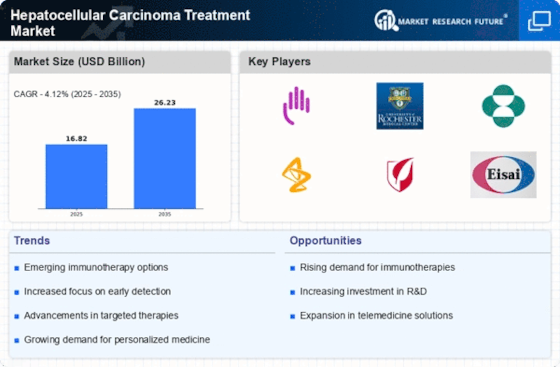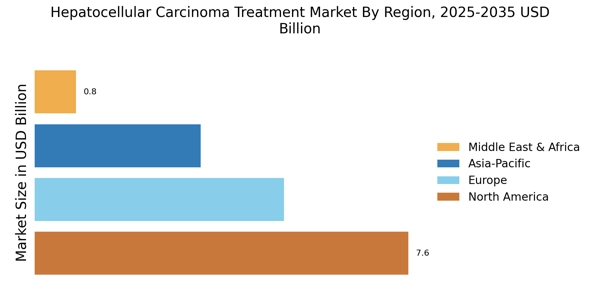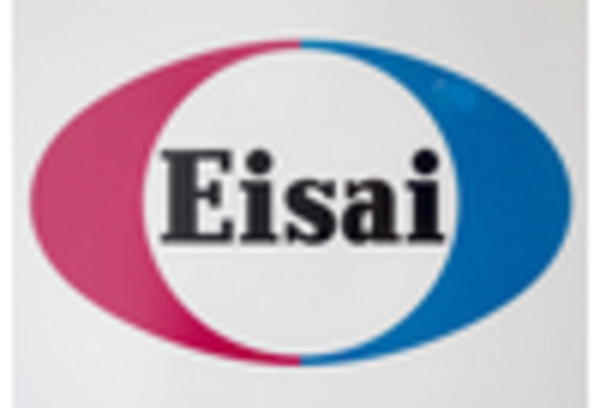Increase in Hepatitis Prevalence
The rising prevalence of hepatitis infections, particularly hepatitis B and C, is a critical driver for the Hepatocellular Carcinoma Treatment Market. Hepatitis infections are known risk factors for the development of hepatocellular carcinoma, leading to an increased patient population requiring treatment. According to recent data, approximately 257 million people are living with hepatitis B, and around 71 million with hepatitis C. This substantial number indicates a growing need for effective treatment options in the Hepatocellular Carcinoma Treatment Market. As awareness of hepatitis-related complications increases, healthcare systems are likely to allocate more resources towards screening and treatment, further propelling market growth.
Advancements in Treatment Modalities
Innovations in treatment modalities, including targeted therapies and immunotherapies, are significantly influencing the Hepatocellular Carcinoma Treatment Market. The introduction of novel agents such as sorafenib and lenvatinib has transformed the treatment landscape, offering new hope for patients. Furthermore, the development of combination therapies is showing promise in enhancing treatment efficacy. Market data suggests that the global market for hepatocellular carcinoma treatments is projected to reach USD 5 billion by 2026, driven by these advancements. As research continues to unveil new therapeutic options, the Hepatocellular Carcinoma Treatment Market is expected to expand, catering to a broader range of patient needs.
Aging Population and Lifestyle Factors
The aging population, coupled with lifestyle factors such as obesity and alcohol consumption, is contributing to the rise of hepatocellular carcinoma cases, thereby impacting the Hepatocellular Carcinoma Treatment Market. As individuals age, the risk of developing liver diseases increases, which in turn elevates the likelihood of hepatocellular carcinoma. Additionally, lifestyle choices that lead to liver damage are becoming more prevalent. Data indicates that the incidence of hepatocellular carcinoma is expected to increase by 2.5 times by 2030, highlighting the urgent need for effective treatment solutions. This demographic shift is likely to drive demand within the Hepatocellular Carcinoma Treatment Market, as healthcare providers seek to address the growing burden of this disease.
Growing Awareness and Screening Programs
The increasing awareness of hepatocellular carcinoma and the importance of early detection are pivotal drivers for the Hepatocellular Carcinoma Treatment Market. Public health initiatives aimed at educating populations about liver health and cancer risks are gaining traction. Screening programs for high-risk individuals, particularly those with chronic liver diseases, are being implemented in various regions. This proactive approach is likely to lead to earlier diagnoses, which can significantly improve treatment outcomes. As a result, the demand for effective treatment options in the Hepatocellular Carcinoma Treatment Market is expected to rise, as more patients are identified and treated at earlier stages of the disease.
Regulatory Support and Funding for Research
Regulatory support and increased funding for research initiatives are vital drivers for the Hepatocellular Carcinoma Treatment Market. Governments and health organizations are recognizing the need for innovative treatment solutions and are investing in research to develop new therapies. Initiatives aimed at accelerating drug approval processes and providing financial support for clinical trials are becoming more common. This environment fosters innovation and encourages pharmaceutical companies to invest in the development of new treatments for hepatocellular carcinoma. As a result, the Hepatocellular Carcinoma Treatment Market is likely to benefit from a steady influx of novel therapies, enhancing treatment options available to patients.

















